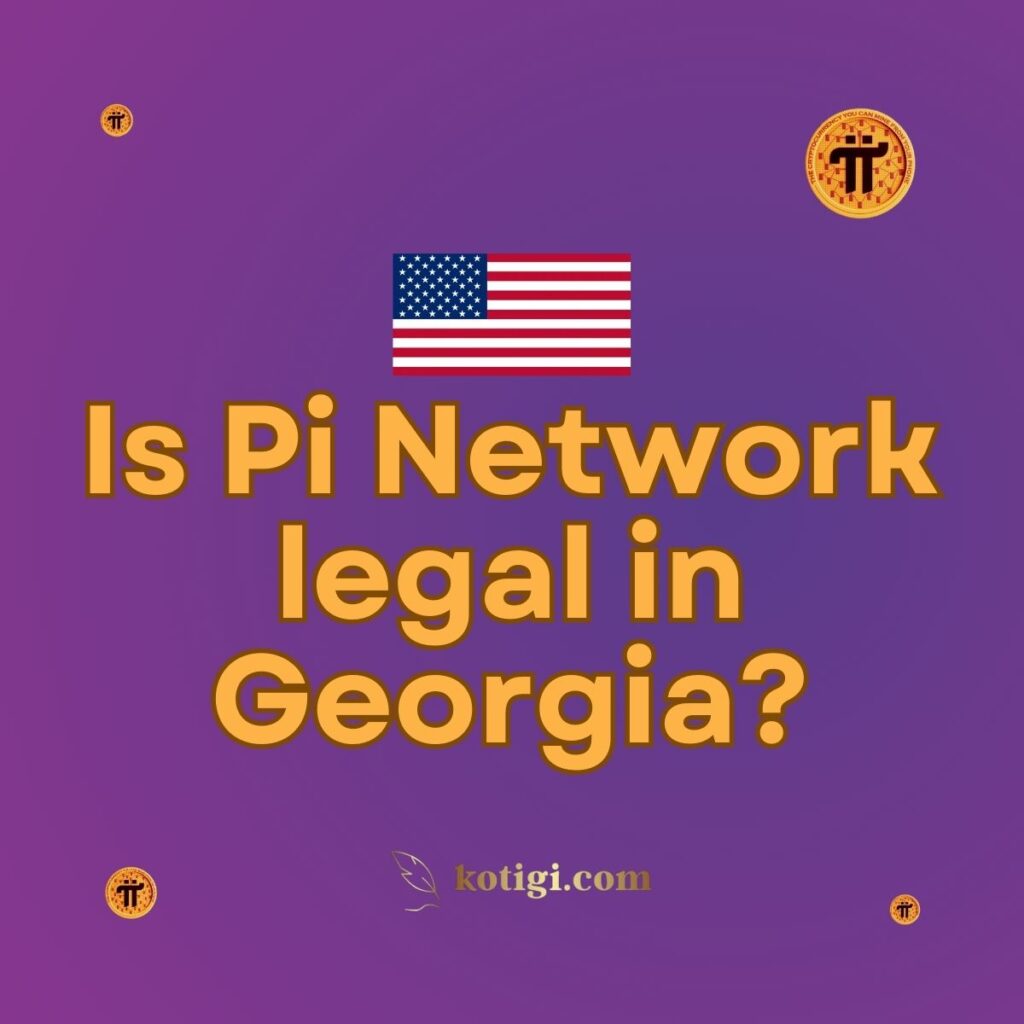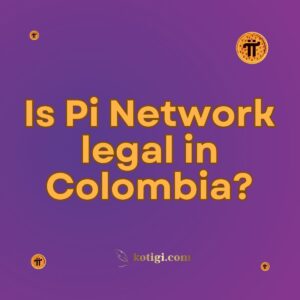
Is Pi Network legal in Georgia?
Yes, Pi Network is legal in Georgia, with no specific state restrictions on the use of this or similar blockchain-based networks. Participants in Georgia can legally engage with Pi Network as long as they follow federal regulations set by the IRS and SEC. Although Pi Network currently does not allow token trading, Georgia’s progressive stance on blockchain technology supports its use.
Introduction
Cryptocurrencies and blockchain platforms like Pi Network have drawn considerable interest in Georgia. Known for its favorable business environment, Georgia has adopted blockchain-friendly policies, making it easier for residents to explore and engage with new digital currencies. However, questions surrounding Pi Network’s legal status often arise, especially since it enables mobile-based cryptocurrency mining without a traditional transaction structure. This guide explores the legality of Pi Network in Georgia, examines the relevant federal and state regulations, and provides insight into the broader crypto landscape within the state.
Cryptocurrency Regulation in Georgia
Georgia’s General Cryptocurrency Stance
Georgia has been relatively proactive in its adoption of blockchain and digital currencies, creating a favorable environment for blockchain initiatives. The state currently lacks specific regulations targeting Pi Network or other blockchain networks that enable mobile mining, making Pi Network a legal entity for residents.
Support for Blockchain Innovation
Georgia’s business-friendly regulatory approach also extends to blockchain technology, making the state attractive for companies working in the digital currency space. With initiatives aimed at promoting financial and technological advancements, Georgia encourages innovation while ensuring that consumers remain protected.
Federal Laws Affecting Pi Network Users in Georgia
SEC Guidelines for Cryptocurrency Classification
The Securities and Exchange Commission (SEC) enforces regulations on digital assets, focusing mainly on assets considered securities. Since Pi coins cannot yet be traded, the SEC has not classified them as securities. Therefore, residents in Georgia are free to participate in Pi Network without needing additional licensing or registration from the SEC, although future trading options might bring regulatory changes.
IRS Tax Reporting Obligations
The Internal Revenue Service (IRS) considers digital assets to be taxable property. While Pi coins lack market value due to their non-tradable status, users should keep detailed records of their mining activity, especially if Pi Network’s coin becomes tradable in the future. This proactive record-keeping will facilitate tax compliance, should Pi Network’s status change.
Georgia’s Consumer Protection Laws
Georgia Fair Business Practices Act
Georgia’s Fair Business Practices Act seeks to prevent deceptive practices and protect consumers from fraudulent schemes. If Pi Network introduces new features or moves toward token trading, Georgia’s consumer protection framework can offer legal recourse for users in case of suspected fraud or unfair business practices. Currently, Pi Network operates transparently, posing minimal risk to users. However, users are encouraged to stay informed of any policy changes to continue protecting their assets.
Tips for Secure Participation in Pi Network
While Pi Network’s design minimizes security risks, users should still take necessary precautions. Since participation is mobile-based, securing devices with strong passwords and two-factor authentication (2FA) is advised to prevent unauthorized access. Georgia residents can use this approach to protect their assets and participate in Pi Network with confidence.
Economic and Business Opportunities in Georgia
Potential for Blockchain Business Growth
Georgia has a robust and growing technology sector, making it a prime location for blockchain innovation. This environment could benefit Pi Network participants interested in business applications, such as digital rewards programs or blockchain-based solutions, as local businesses gradually incorporate blockchain technology.
Local Partnerships and Business Incentives
Pi Network’s model is unique in its focus on digital engagement rather than monetary transactions. In Georgia, this presents opportunities for partnerships with businesses exploring digital customer engagement and loyalty programs. Although Pi coins are not yet used as transactional currency, their potential integration into local business ecosystems holds promise for future applications.
Environmental Benefits and Sustainability
Georgia’s Environmental Commitments
Georgia is actively pursuing sustainability initiatives, which align with the energy-efficient mining model that Pi Network employs. Unlike traditional cryptocurrency mining, which often consumes large amounts of power, Pi Network’s mobile-based mining is low-energy and fits well with Georgia’s eco-friendly goals.
Mobile-Based Mining as a Sustainable Solution
Pi Network’s mobile-friendly approach to cryptocurrency mining is ideal for environmentally conscious users. By reducing energy consumption, Pi Network offers an eco-friendly alternative to conventional blockchain operations, appealing to Georgia residents committed to sustainability.
Educational Resources for Blockchain in Georgia
University Programs and Blockchain Initiatives
Georgia’s universities, such as Georgia Institute of Technology and University of Georgia, offer blockchain-focused programs, courses, and events that can enrich users’ understanding of cryptocurrency and blockchain technology. Georgia residents participating in Pi Network may benefit from these resources, which provide valuable insights into the legal, financial, and technical aspects of digital currency.
Blockchain Events and Networking Opportunities
Georgia is home to a variety of blockchain conferences and meetups, providing Pi Network participants with opportunities to connect with other cryptocurrency enthusiasts. Events like Atlanta Blockchain Week foster community knowledge-sharing, helping users stay informed about the latest trends and regulatory updates that could affect Pi Network’s standing in the state.
Future Legal Landscape for Pi Network in Georgia
Current Legal Status and Implications
At present, Pi Network is legal in Georgia, with no state-specific restrictions inhibiting its operation. Users can legally mine Pi on their devices, provided they comply with federal tax guidelines. While no state-specific laws directly impact Pi Network, Georgia residents should remain attentive to potential changes in cryptocurrency legislation.
Anticipated Regulatory Changes
As cryptocurrency becomes increasingly mainstream, Georgia may introduce new regulations to address consumer protection and security for digital assets. The state’s proactive approach to blockchain technology suggests that any future regulations will prioritize innovation alongside consumer protection, creating a favorable environment for Pi Network.
Conclusion
Pi Network remains legal in Georgia, where the state’s open-minded stance on blockchain technology supports its development. By following federal laws set by the SEC and IRS, residents can confidently participate in Pi Network. With Georgia’s favorable tech landscape and a low-energy mining approach, Pi Network has the potential to thrive among the state’s environmentally conscious users and tech-savvy business community. As Pi Network evolves, Georgia participants should remain aware of regulatory developments and best practices for secure, compliant participation.
Key Takeaways
- Legal Status: Pi Network is legal in Georgia, with no state-specific restrictions on its operation.
- Federal Compliance: Users must comply with SEC guidelines and IRS tax reporting requirements, ensuring legal participation.
- Consumer Protection: Georgia’s Fair Business Practices Act protects users from fraudulent activities.
- Business Potential: Georgia’s business-friendly environment may support partnerships and local applications for Pi Network in the future.
- Environmental Fit: Pi Network’s energy-efficient mining process aligns with Georgia’s sustainability goals.
- Educational Resources: Local universities and blockchain events provide educational support for Georgia residents interested in blockchain and cryptocurrency.





